The biggest entertainment stories
Get our big stories about Hollywood, film, television, music, arts, culture and more right in your inbox as soon as they publish.
You may occasionally receive promotional content from the Los Angeles Times.
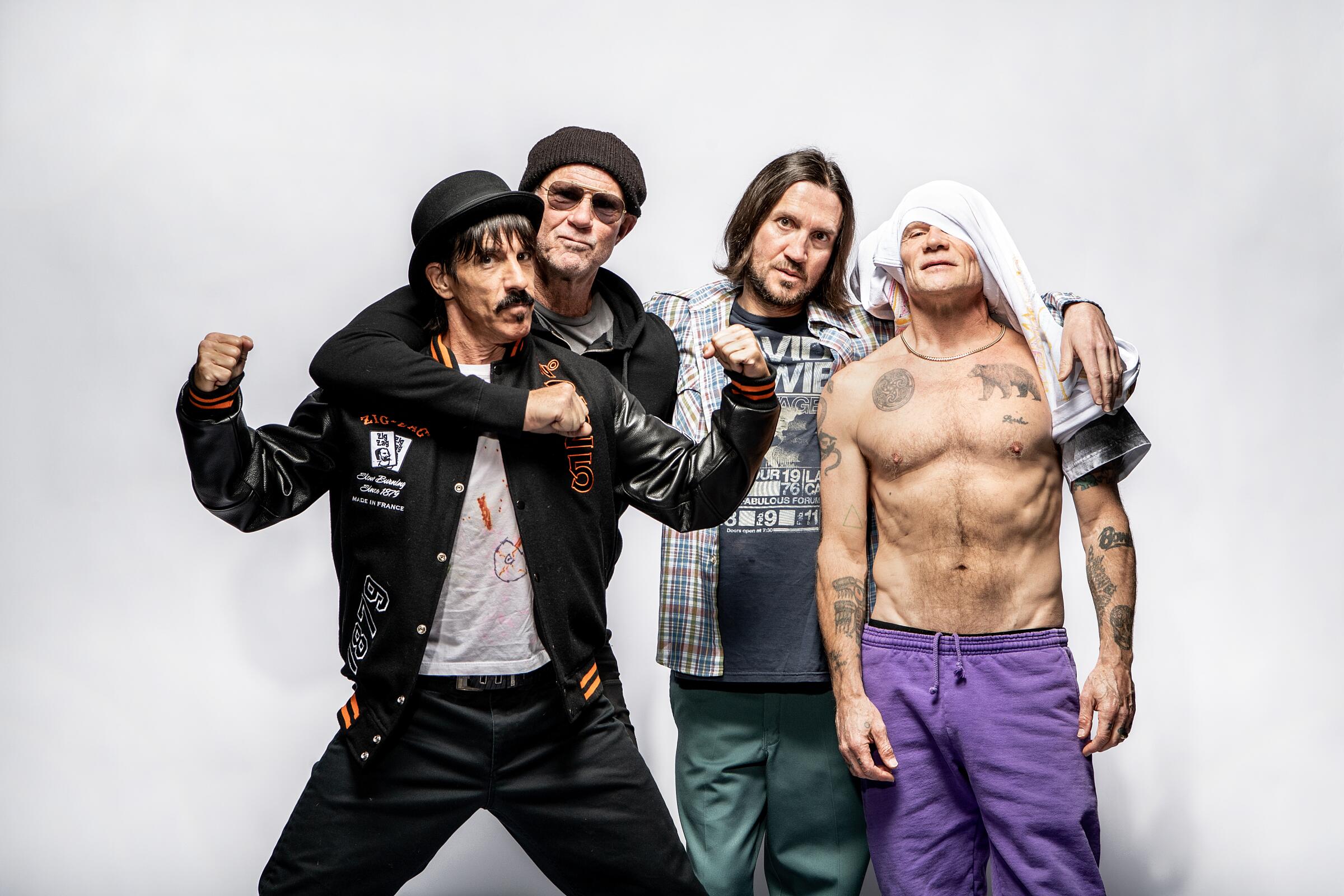
Dressed in the signature colors of the basketball team he loves — loves even when the team pains him as it has over the last few months — Flea comes roaring into the parking lot of the Red Hot Chili Peppers’ Van Nuys rehearsal space astride a glittering Harley-Davidson that matches his purple sweatpants and gold sneakers.
“It’s the best way to get around this town,” he says of the motorcycle, which the bassist’s wife, streetwear designer Melody Ehsani, recently had painted Los Angeles Lakers-style for his 59th birthday. Flea has been a Lakers season ticketholder for 22 years, and he reckons that this latest go-’round, in which the iconic NBA club is struggling to find a spot in the playoffs, “is the single most disappointing season in the history of the team.”
“It’s hard, because I really like all the guys,” he says. “Love Malik Monk. Love Talen Horton-Tucker. Really love Austin Reaves — you know, ‘Hillbilly Kobe.’ When they boo Russell Westbrook, it breaks my heart. But basketball, like music, is such an energetic, spiritual thing. You can put a bunch of great players together, and it doesn’t mean they’ll create magic.”
Unless you’re the Red Hot Chili Peppers, which nearly four decades after forming in L.A. in the mid-1980s are somehow still thriving. On Friday, the day after the band is set to get a star on the Hollywood Walk of Fame, the Chili Peppers will release “Unlimited Love,” their 12th studio album in a career that’s contained no shortage of turmoil.
Full of springy punk-funk jams and lightly psychedelic ballads, the new 17-track LP is the Chili Peppers’ first since 2006’s Grammy-winning “Stadium Arcadium” with guitarist John Frusciante, whose playing on hits like “Give It Away” and “Under the Bridge” helped propel the group to alt-rock superstardom in the early ’90s before the rigors of fame and a debilitating drug addiction led him to quit. (Frusciante, who’s now 52, returned in 1998, then left again in 2009.)
More impressive than the album, the Chili Peppers — Flea (born Michael Peter Balzary), Frusciante, singer Anthony Kiedis, 59, and drummer Chad Smith, 60 — are set to tour this summer as one of the very few Gen X rock bands capable of filling stadiums at a moment when hip-hop dominates pop music.
Among their opening acts will be fellow Angelenos Thundercat, Anderson .Paak and Haim — just a handful of the younger admirers who’ve kept the Chili Peppers’ anything-goes spirit alive through cultural shifts that have made other legacy acts seem stuck in the past by comparison.
“The Chili Peppers were such early genre-blenders,” says Remi Wolf, the 26-year-old L.A. musician whose madcap debut features a song called “Anthony Kiedis.” “The freedom in their music — so raw, so funky, so California — is super-inspiring to me.”
Indeed, it’s not quite that the band’s vintage sound is all over the charts these days — though one current chart-topper, Bruno Mars, did bring the band along with him when he played the Super Bowl halftime show in 2014.
“Back in the ’90s, you couldn’t shake a stick without hitting a singer with long hair and his shirt off and a bass player slapping,” Smith says of the era when such groups as Incubus, 311 and Sublime were building on the success of the Chili Peppers’ 1991 smash, “Blood Sugar Sex Magik.” “But now? I’m not sure I could name a new band and say, ‘Oh, yeah, I hear us in there,’” the drummer says.
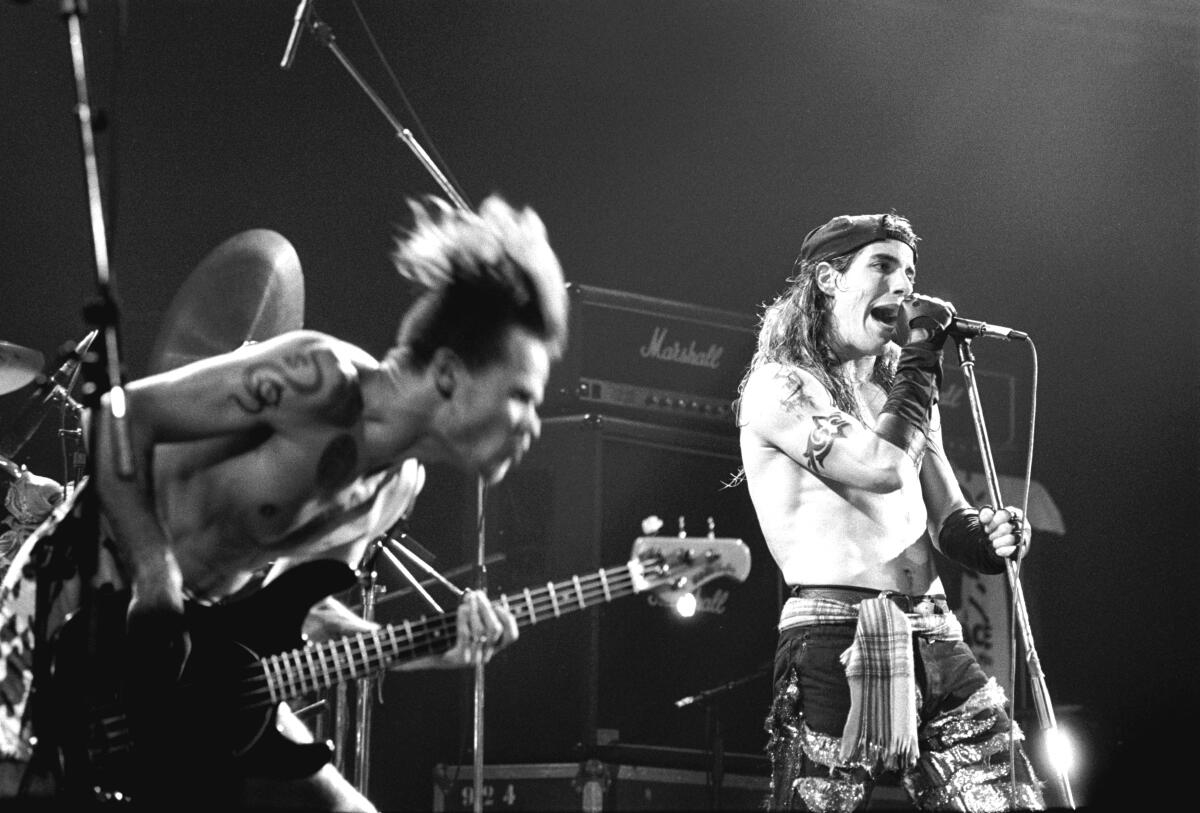
Rather, it’s the Chili Peppers’ vibe — kind of brainy, kind of bro-y, attuned to pleasure yet always seeking some higher plane of fulfillment — that seems to be resonating in an age of wellness centers and micro-dosing.
“It’s nice not to feel like the world has passed you by,” says Kiedis, whose ’70s-style mustache bespeaks a certain confidence in his status. (“When the boyish charm fades, you have to invite in the next type of charm,” he replies when asked why he opted for the ’stache.) “I love it when my son’s friends put on their playlists and we’re on there with Kid Cudi or someone.”
Though Frusciante wasn’t a founding member of the band — he joined at age 18 in 1988 following the fatal heroin overdose of original guitarist Hillel Slovak — everyone in the group agrees that the Chili Peppers are at their Chili-est with the spacey but soulful Frusciante on guitar.
Says Rick Rubin, who produced the band’s classic ’90s records and returned to the studio with them for the first time in years for “Unlimited Love”: “John is an incredible technician, and that’s the least of his musical gifts. The connection between members of this version of the band is unlike any other.”

Precisely why Frusciante quit the second time is unclear; he’s said he wanted to focus on solo music but recently told Classic Rock magazine that he “got deep into the occult” while on tour behind “Stadium Arcadium.”
For this story, the guitarist, a sweet but more reserved presence than his backslapping bandmates, would talk only through email and declined to engage the question directly.
Of rejoining his old pals — something Rubin says he never considered as a possibility — he wrote, “It was mainly because I love them and felt that we had unfinished business on a soul level. There are aspects of our love and respect for each other that can only be communicated by playing together.”
Flea says they eased back into action by doing covers: the Kinks’ “Waterloo Sunset” (“Such a beautiful song”), the New York Dolls’ “Trash,” blues tunes by Freddie King and John Mayall. “That was John’s idea,” he says. “Let’s not get right into writing songs or playing our old songs. Let’s just have some fun.”
Frusciante’s return, of course, meant a forced exit for his former replacement, Josh Klinghoffer, who played on 2011’s “I’m With You” and 2016’s “The Getaway.” Letting the guitarist go was uncomfortable, Kiedis admits. “‘Awkward’ is probably an understatement. But when the history that you have with somebody dates back to the 1980s and they avail themselves to you,” he adds of Frusciante, “you really don’t have a choice.” (Klinghoffer is now touring as a member of Pearl Jam, which according to Smith was the guitarist’s favorite band when he was growing up. “So it kind of all seems like this is how things were supposed to go,” Smith says.)
Having gotten up to speed with those covers, the Chili Peppers started writing songs in 2019 and soon had dozens to choose from; Flea, Frusciante and Smith tracked their parts in L.A., Kiedis and Rubin then went to Kauai to work on vocals.
At one point, a massive landslide blocked one of the island’s main roads. “I had to take a boat across this river every day with my backpack full of papers and lyrics and pencils,” the singer recalls. “Then I’d walk down a beach and up a small jungle mountain where there would be a Jeep waiting to take me to Rick’s garage studio. I loved it.”
Long one of rock’s most distinctive stylists, Kiedis employs his full battery of grunts and bellows and funny voices on “Unlimited Love.” In “Black Summer,” which he hears as a cross between early Nirvana and Welsh folk music, he even adopts an accent that he says is his tribute to the Welsh indie-rock singer Cate Le Bon.
Yet Kiedis also gets in his feelings amid Frusciante’s shimmering guitar lines in songs like the tender “Not the One” and “White Braids & Pillow Chair,” a gorgeous California travelogue in which he gazes up at the “deep Ventura sky” and ponders the gloom of “Santa Cruz in June.” It’s a reminder that another reason the Chili Peppers have endured, beyond the prescience of their mix-and-match approach, is the frontman’s unembarrassed emotionalism.
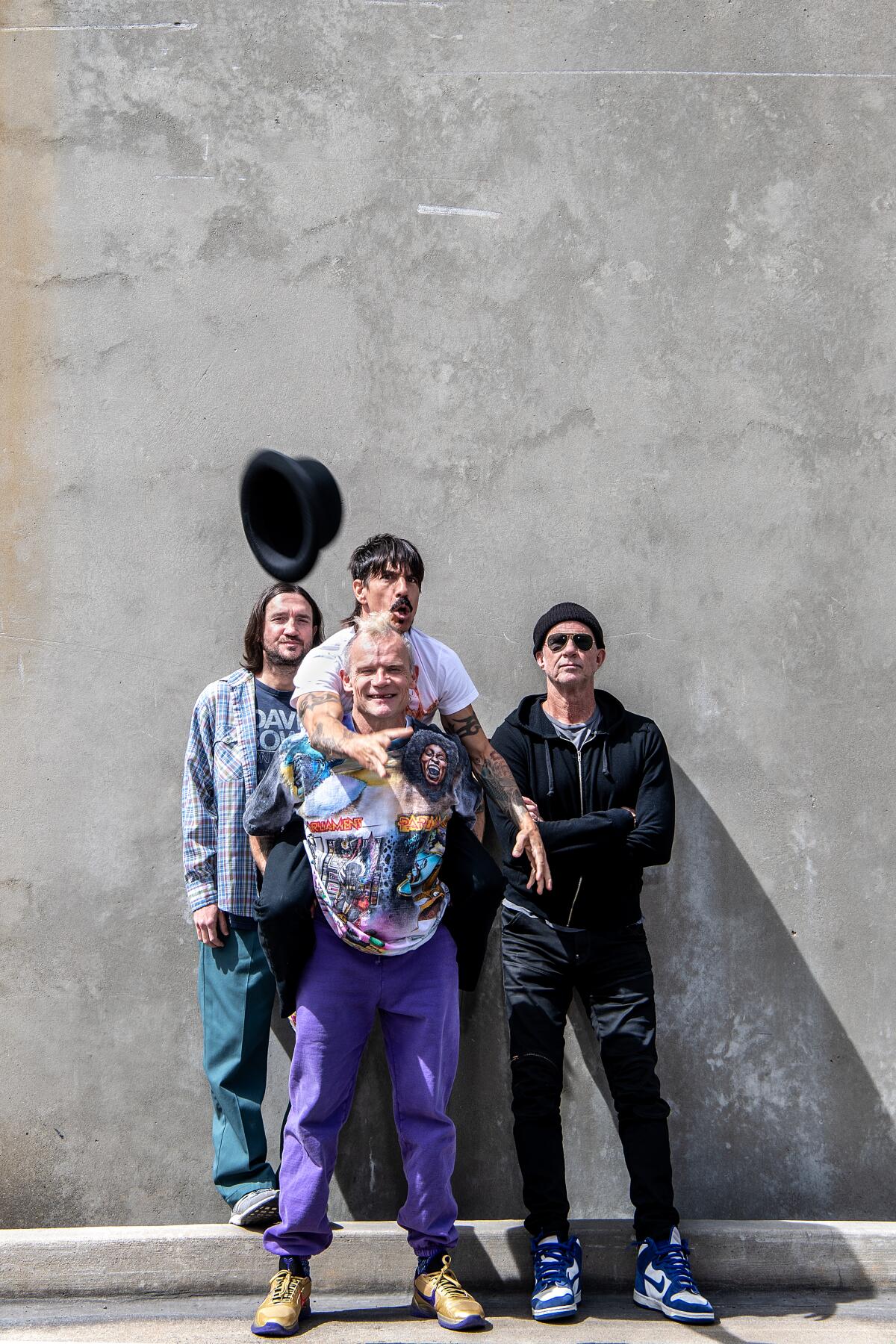
Remi Wolf says she wrote “Anthony Kiedis” after being moved by how “candidly and vulnerably” the singer discusses his complicated relationship with his father in his 2004 memoir, “Scar Tissue.” Kiedis’ dad, Blackie Dammett, was an actor and Hollywood scenester who raised Kiedis in a heady atmosphere of sex and drugs; Dammett died last year after a lengthy bout with what the singer describes as “Alzheimer’s-like dementia.”
Given the nature of that disease, “I didn’t feel a wave of loss and sadness when he died,” Kiedis says. “I’d actually been feeling waves of loss and sadness for the last few years while he was alive, because he wasn’t able to communicate verbally or really in any way, other than possibly telepathically. So by the time he was ready to die, I was ready for him to go wherever he got to go. He’d finished his job here on Earth.
“I miss him. Many times, I’ll be riding my motorcycle down Sunset Boulevard, through the curvy section, and I’ll just remember little things that I shared with my dad in the ’60s and ’70s. I wish I could holler at him, tell him what I’m thinking about. But it’s not painful. It’s more like a happy melancholia.”
Kiedis says his own co-parenting of his 14-year-old son, Everly — his mom is model Heather Christie, with whom the never-married Kiedis was romantically involved in the mid-2000s — is “the single greatest thing that I have going on.” He laughs. “And teenagers are a hard lot to coexist with, especially when you’re trying to have any say with their molding and shaping. It’s like trying to sculpt some clay on a pottery wheel that’s going 8 million miles an hour.”
The other day, Everly and two of his friends lost a bet that required them to shave their heads. “And they all had thick, flowy, wavy mops of hair, which they care for greatly and look in the mirror with their brushes and get ready to go and impress at school,” Kiedis says. “But they wanted to keep their word, so they lined up to be shorn.
“I also think they were excited about the prospect of doing something kind of crazy. They go to these pretty normal high schools; everybody has that midlength haircut. And they walked out of my house looking like they were in ‘The Decline of Western Civilization,’” he says, referring to Penelope Spheeris’ early-’80s documentary about the L.A. punk scene. “I was like, ‘OK, the spirit is alive.’”
The coziness of Kiedis’ story reflects the stability he values in middle age — just another dad who “sort of understands” cryptocurrency and NFTs. “I can see the point of wanting to create currency that is independent of government,” he says. “That ideological notion resonates with me. But the metaverse? Seems like yet another platform, and reality is a weirder and deeper platform than any other.”
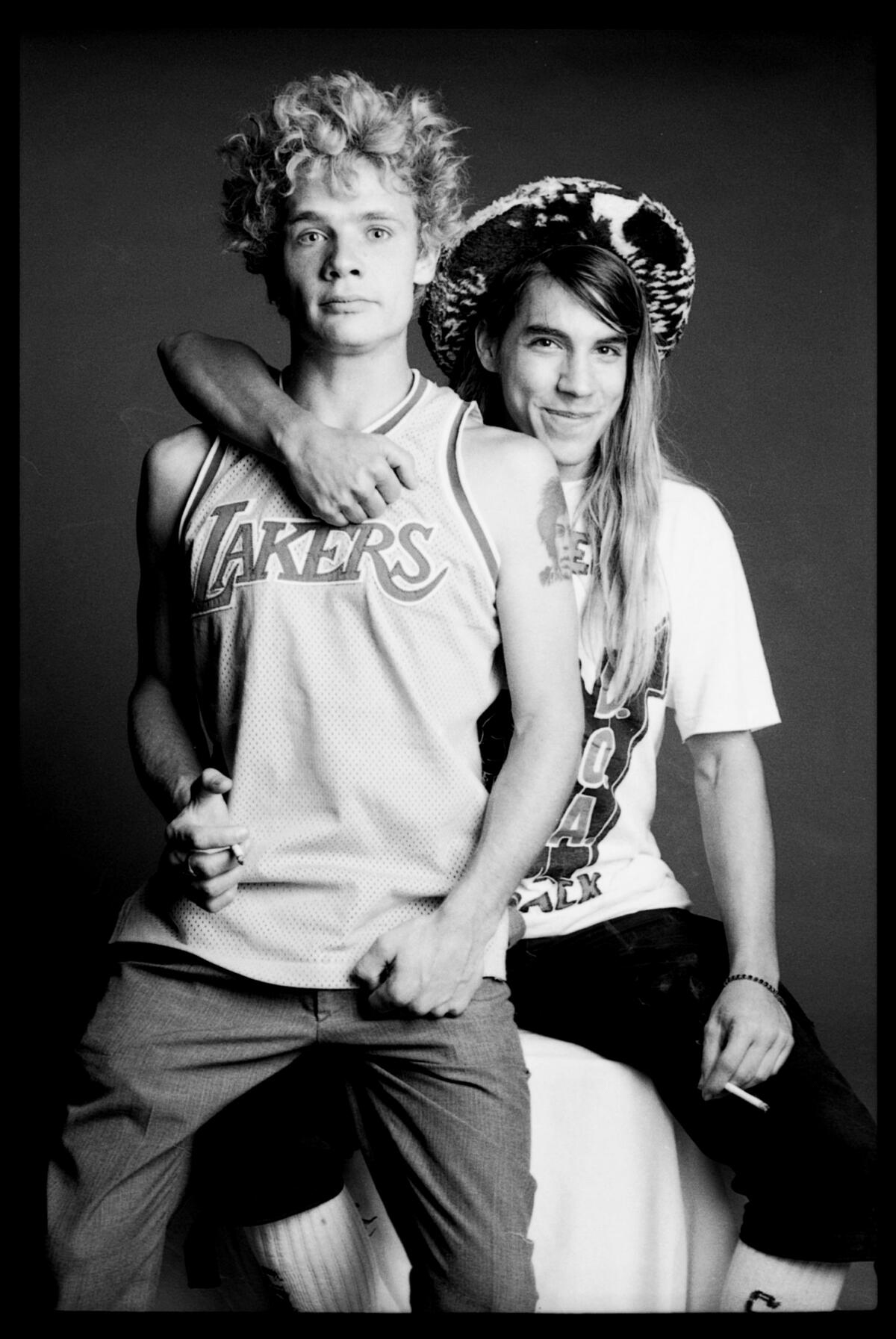
The singer, who’s spoken openly about his struggles with addiction, says “sobriety is a way of life for me”; Flea, who in his own words spent his 20s in a “drug-shooting, crack-smoking freak-out,” now “has a hit of weed maybe once a month and a Blue Moon like twice a year.” (Like Kieidis, Flea and Smith are dads as well.) As he recounts in “Scar Tissue,” Kiedis has a history of “sexual indulgence” that, as he puts it today, “wasn’t necessarily completely healthy.” Yet he looks back philosophically on the more extreme phases of his life: “Living in this ultra-free scenario came with maybe a wolf bite or two, but it also came with the feeling of being alive — and maybe you don’t want to forget what it feels like to be that alive and that much in danger.”
Flea and Kiedis both talk about their concern for L.A.’s civic welfare — “The homeless situation is absolutely insane,” Flea says, with “this whole sub-strata society underneath the people-that-have-homes society” — though each cops to a reflexive distrust of the top-down political process.
“I love this town, and I want to be of service to my community, but not necessarily through the machinery that currently exists,” Kiedis says. “It all feels demoralizing to me, that machinery and the divisive behavior within it.”
Flea hasn’t been inspired to get behind a candidate in the L.A. mayoral race, “but if there’s someone I end up really believing in, I’ll do what I can.”
“It’s just hard to have any trust in something that is, by nature, about money and power and hustling,” he adds.
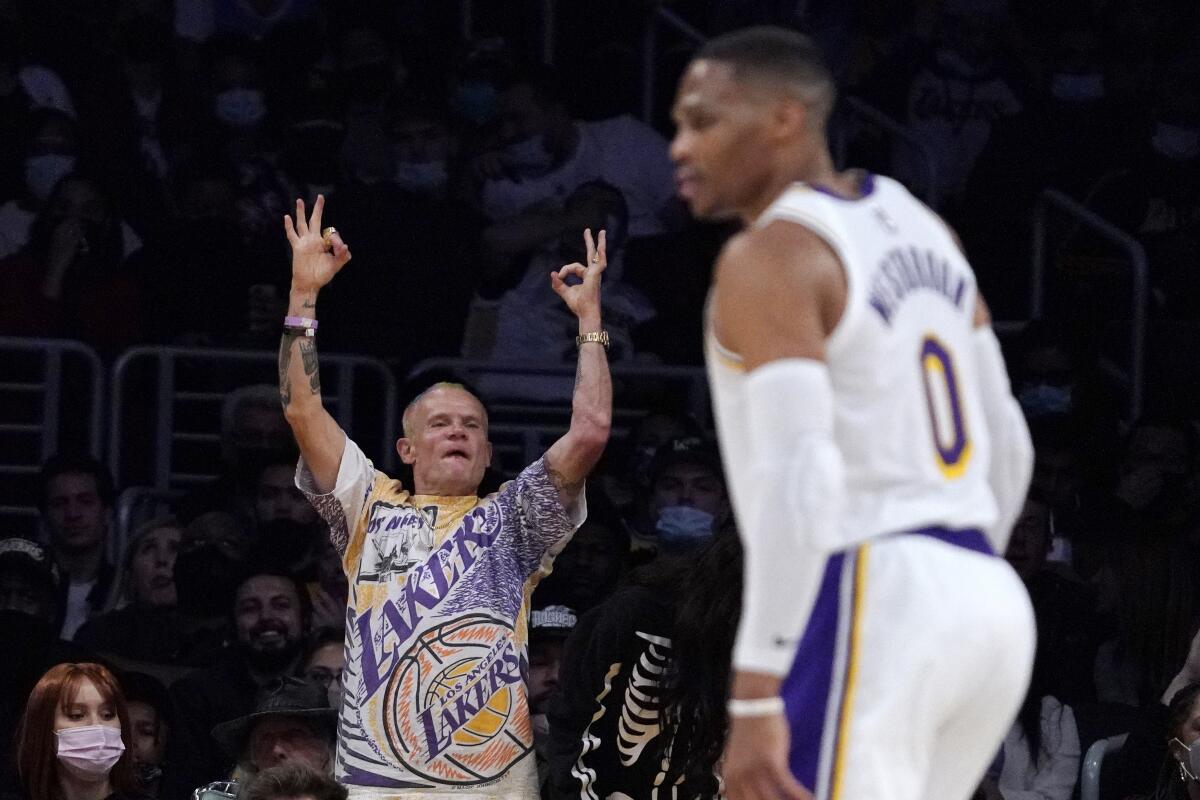
Asked whether grass-roots movements like Black Lives Matter and #MeToo make him more hopeful, Kieids says, “I don’t really need an organization to make me feel hope for culture. I feel it always. And I think with some of these movements, there is a lot of positive, but we have to be careful, because organizations get a momentum that’s about feeding themselves and not feeding the world. I love that conversations are awoken. But I can’t get too involved in it. Question all sides. Don’t let someone else tell you what to think and do.”
And what of the Chili Peppers’ optimism regarding the future of the Red Hot Chili Peppers? Frusciante, after all, has made something of a habit of leaving; Flea acknowledges that the intensity of the band’s world tour, which launches in June in Spain and will stop at Inglewood’s SoFi Stadium on July 31, could be a taxing enterprise for the introverted guitarist.
Still, “everything’s great right now,” says Smith. “John’s dedicated. He’s totally into it.” In his email, Frusciante wrote that “the experience has been as positive and healthy as I had hoped it would be.”
For Flea, the affirming energy is strong enough that he’s even nursing a fantasy about the beleaguered Lakers. “I can almost see it: A.D. gets better,” he says, referring to the perpetually injured Anthony Davis, “they all take ayahuasca, go on a retreat, puke their guts out, come back and win the championship.” He laughs.
“You never know.”
The biggest entertainment stories
Get our big stories about Hollywood, film, television, music, arts, culture and more right in your inbox as soon as they publish.
You may occasionally receive promotional content from the Los Angeles Times.